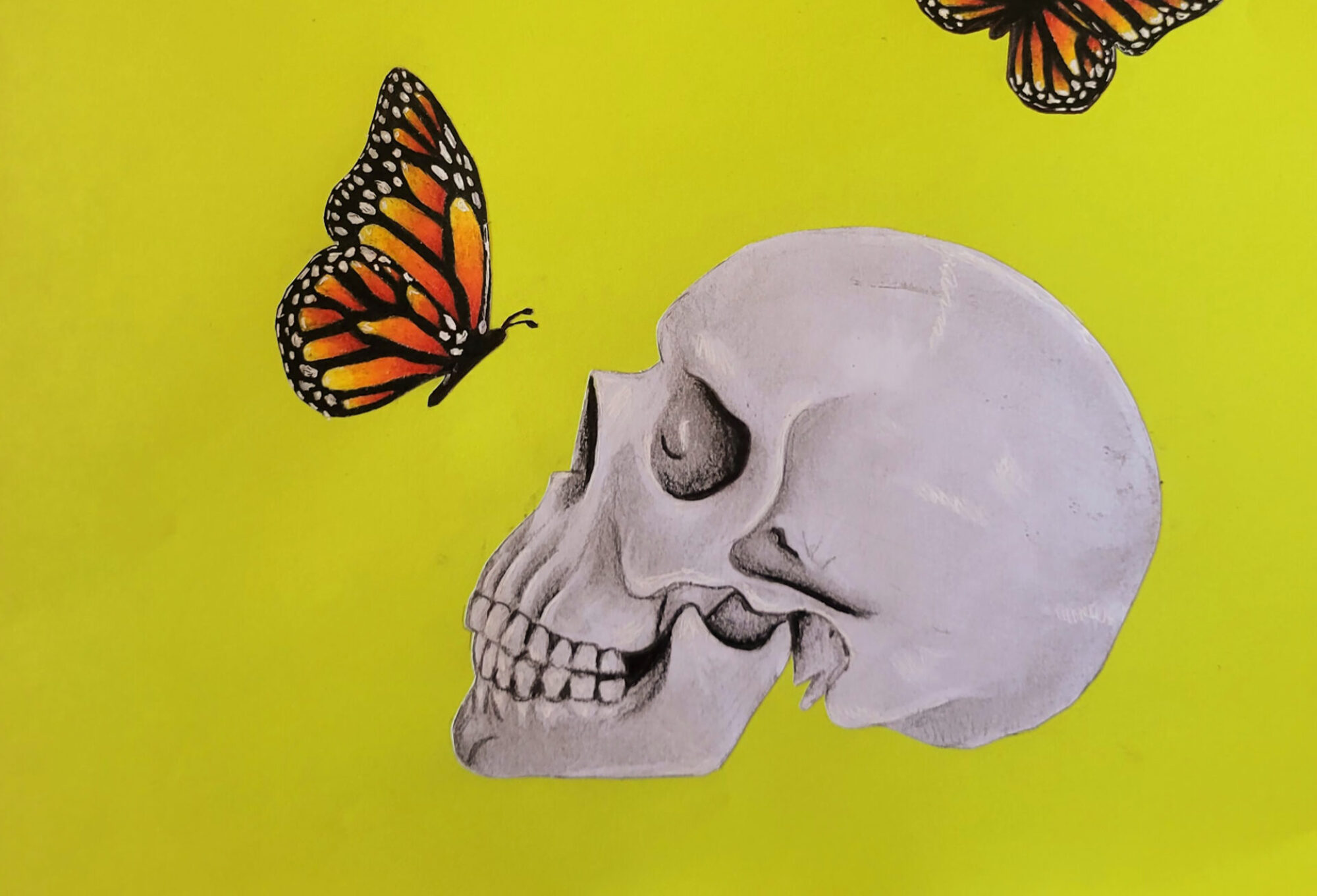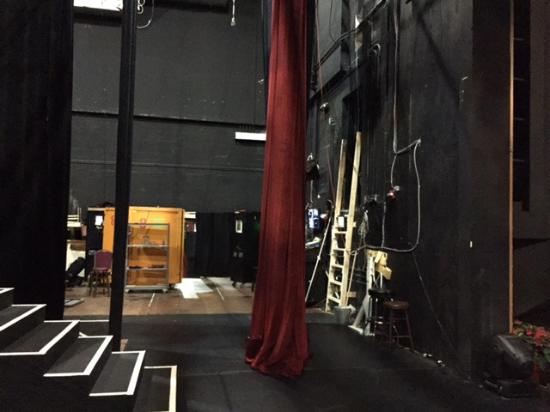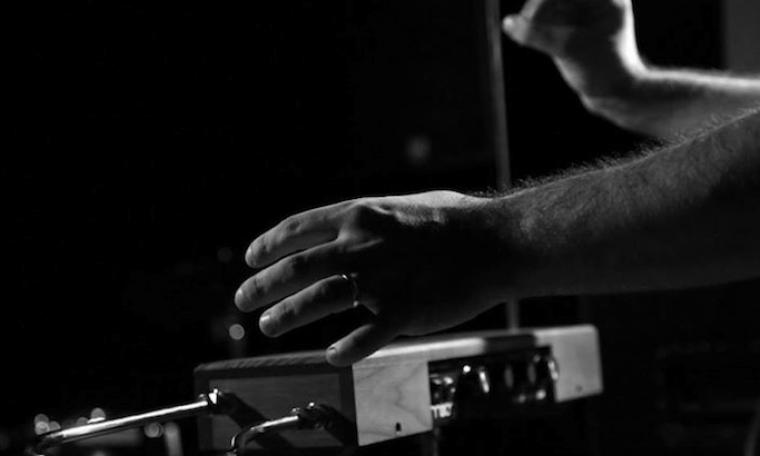In mere minutes the cherry-red curtains would part, Duane would strum that power chord, the hot spotlight would smack Tony in the face, he’d grab the mike and open his mouth; it would all happen. But beyond the fear of not being practiced enough (a fear Tony held so deep he was sure that if anyone needed an extra jolt of stage-fright he could easily supply it), he felt that his burning desire to be here, his “wanting” as Duane had called it, was about to slither down his stocky body, through his legs and out his Reebok high-tops. Tony Grimaldi was about to sing, for his very first time in front of a live audience, leading Duane DeFranco’s band (the most popular rock and roll band in the high school) and poor Tony was having some serious doubts that he’d live through the next few seconds. As Julia Debons stood at the left side of the stage, long loose curls flattened by her headset, and John Anderson stood at the right, his big arms poised on the curtain’s rope, Tony realized this was “the moment” and he wasn’t all so sure he was ready for “the moment” now that it was here.
How this all came to be, how Tony had gotten himself into this mess in the first place, was such an incredible story that Tony only half believed it himself—and he had been in the thick of it all.
What’s worse, Tony had made it all happen.
* * * * *
On a fateful November day of this first year of his life in high school, 1977, Tony had somehow managed to pry himself from his plastic lunch table seat. Ignoring his two friends Bob and Greg, he had walked the tiled expanse of dull green cafeteria floor to the “senior’s section” of the large round loud room. Chubby-cheeked Tony walked right up to the lunch table to Duane, Steve and Ray (the three remaining members of the band Muscle) and the five friends they were joking with. Months later, Tony still wouldn’t be able to recall the other people who were sitting at the table that day-all faces except for the band members a blur in this uncharacteristically brave moment of his-but he could recall the intense feeling of everyone in the cafeteria suddenly stunned into silent seemingly staring at his back. But Tony hadn’t much care—or he was simply too nervous having gotten up the nerve to follow through with his fantasy.
Actually, Tony did care, but he couldn’t allow himself a second thought then, a quick glance back at his usual table in the sophomore section; he had to push on. His plan had been to just walk right up to Duane’s table, that most popular table in all the school, the table everyone who was anyone would love to sit at to ask if the rumor was true.
“Yeah?” Duane asked turning his clean-shaven, sharp face completely on Tony the minute the sophomore had reached him.
Duane was definitely king of the table. From this castle, he caught every movement, every pass, and every visitor. All eyes on him, Tony caught the question in his throat and tried not to faint.
“I…I,” Tony started.
He wanted to stomp his foot, punch his arm, scream, anything to halt this nervousness. He knew he’d only have the briefest second to say what he wanted.
“Spit it out kid,” Steve said. Tony looked down at the chubby boy to his right, sprawled across three chairs.
Tony didn’t know Steve Rainy any better than he did Duane or Billy, and he expected to be just as frightened of him as he was the rest of the band. But when Tony looked at the brown-eyed senior, he couldn’t help but smile. Steve’s eyes may have been dark and heavy-lidded, but his big oval face was open and kind. The big teenager was smiling the broadest grin Tony had ever seen and, despite his “spit it out kid,” Tony felt suddenly at ease, and his question just poured forth.
“Heard you were looking for a singer,” he coughed, his words dropping across the table as heavy as the ham and cheese sandwiches everyone was trying to digest.
“What’s your name?” Duane asked from across the table; he seemed a mile away.
“Tony.”
Tony felt the pull to look over at Steve again, to gather some confidence from that funny face, but his eyes were now locked on Duane’s small blue eyes.
Duane DeFranco had a face nobody could read. It wasn’t mean, but it wasn’t friendly either; a long nose, high cheekbones and a thin line of lips. Bob had quipped, “totally cold, man,” and that was exactly what Duane was. He was one of the most popular boys in school and also one of the most mysterious. He was quietly polite, never raised any trouble, but he had a reputation of being very serious when he spoke (which he had never done to Tony before) and deeply devoted to his band and their music. He was considered the best guitarist in Marrymount High and his band, Muscle, was always invited to play every season’s talent show. But the spring concert was two months away, and Muscle had just lost their lead singer.
“You sing,” Duane said.
This wasn’t a question, merely a statement, and Tony breathed a silent sigh of relief not actually needing to admit the fact out loud. Having to say, “I’m a singer, and I thought maybe I could try out for your band,” had seemed so silly to Tony when he had practiced it in his mirror the night before; luckily, Duane had saved him the trouble. The question was: what would Duane now do with this information?
“Pick you up in front of the gym after school,” Duane said and then went back to his sandwich and the tall red-haired girl sitting to his right on the radiator.
The normal conversation around the table continued, and Tony turned as quickly as he could without seeming like he was escaping (which is exactly what he was doing), and slowly walked back to his table of frozen buddies as the world returned to normal around him.
At 2:45 Duane pulled his car to the front of the gym, and Tony waved and opened the passenger-side door. Duane kept the radio at a moderate volume, quite contrary to what Tony had imagined this long-haired guitar player enjoying, and drove to his house. After a few preliminary questions: “Where do you live?” “Sophomore right?” “Got a microphone?,” the two boys settled into a bumpy silence.
Duane’s clean car was also something of a contradiction, Tony thought as he sat back in the immaculate black and gray checked bucket seats. Duane should be driving a big gas guzzling van or maybe even a motorcycle, right? Tony pictured the rest of the band hanging out of dented doors, music blaring, and cigarette smoke or worse pouring from half-cracked windows as they hit the shore on weekends trying to score summer gigs they weren’t old enough as of yet to play. But as Duane pulled up his tree-lined street, up into his driveway and shut the car off, Tony realized his assumptions of Duane could be (and very well were) completely wrong.
A minute later, the two boys were out of the car, walking around the side of Duane’s red brick house, crunching a few wood chips scattered over the brick side walkway and to the open side door.
“Hey kid,” Steve greeted Tony as the younger boy descended the basement stairs before Duane. The big drummer reached his heavy hand across the couch he was sitting on, and Tony shook it.
“What’s up?” Billy managed from across the room. He was sitting at Steve’s glossy black drum set, his lanky arms draped down the front tom-toms like he belonged there.
“Get up man,” Steve chuckled from across the room. “Battle stations.”
Billy jumped from the drums in mocked attention, vaulted across the room, his long legs and skinny body making him look like a scarecrow lumbering about, and came to stand at his squat bass amp. He put a blonde bass guitar around his neck as Duane made his way down the stairs.
“Use that mike,” Duane said, waving at the silver microphone and stand in the center of the room. He crossed behind Tony, faced his five-foot high guitar amp and lifted his jet black Les Paul guitar.
Tony walked to the center of the room and the silver-headed microphone on the high stand. Managing a quick twist to the center of the stand, lowering the mike to his mouth, Tony was happy to be doing something while the players behind him plugged in and shimmied.
Here was the moment of truth. Here was what all those countless hours in his room in front of his mirror had pushed him toward. For better or worse, Tony’s hours of screaming over his radio, straining one eye to gaze at his reflection in his closet mirror, those study-hall singing ‘lessons’ with Tina watching “The Midnight Special” incessantly—all that work had led him to this moment. But then, Tony was filled with a blinding panic that rose around his white Reebok high-tops all the way to his black, curly-haired head.
What was he going to sing!?
Duane solved any and all problems by hitting the loudest power chord Tony had ever actually been in a room with, and the band began playing “Good Lovin’ Gone Bad.” This was one of the few Bad Company songs Tony not actually knew, but he could manage.
The funny thing about coincidences is that they do happen. Tony had read that quote someplace and knew that, here in Duane’s basement that first hour, it surely applied. The cover songs the band had kept playing—The Who, Bad Company, even Jethro Tull—Tony knew and kept singing, never missing a word or beat. Every song they picked he knew, even songs that they were all too young to have ever actually heard on the radio when they were first popular. Somehow these three seniors were in complete sync with him, a frightened sophomore who had only ever kissed two girls in his whole life, one of whom was, technically, his best friend.
“Cool,” Billy said after the last song. Tony turned to look at the skinny blonde-haired boy who was smiling at him.
“Real cool,” he added.
“Hey, that was good kid,” Steve said from behind him.
A silence descended on the room as Tony waited for Duane’s opinion.
“We practice four nights a week,” Duane offered as Tony slowly turned to the big guitar player. “Need a ride?”
* * * * *
That was two months ago. Now, Tony stood on this stage with “his” band, ready to sing “their” songs. He could hear the two girls tap dancing on the other side of the curtains. Mary and Tina Maran were the best dancers in the school, and though Tony had a crush on Tina and would have liked to have watched her dance , here he was, standing with his band, locked at his place at the microphone.
He managed a quick glance over his shoulder and returned Steve’s smile from behind the drum set.
Tony remembered…
* * * * *
“You sing real good,” Steve said.
Duane and Billy had gone to the local convenience store for some soda (again, Tony was surprised, these guys weren’t trying to score beer from an older sibling or something) while he and the big drummer sat waiting on the cold basement steps. It was Tony’s third practice with Muscle, and he was still trying to shake off the shock that he, a sophomore, was signing with these seniors.
“You guys think I’m okay?” Tony asked.
“You wouldn’t be singing for us if we didn’t,” Steve answered.
“Look,” Steve continued, placing his big hand on Tony’s thin shoulder. “Duane’s never gonna say too much. I’m his best friend, and he hardly speaks two sentences to me a day. If you are singing with us, it’s because we all like ya.”
“Cool,” Tony said and smiled. “But I mean I am a sophomore and you guys…”
“Who cares man?” Steve answered standing up as the side door above them opened. “If ya can sing, ya can sing.”
Tony had needed those words of encouragement so much then and was grateful to the always smiling drummer. He wished he could see more of Steve when they played; the big guy was always able to make a face and crack him up when he needed it. But Tony wasn’t really good at moving; he was barely comfortable singing.
Tony had known he had a voice since he was little. His mom always told the story of how she would catch him in his room signing into a borrowed chess piece from his dad’s set, making believe the rook was a microphone. It was no wonder he had grown up wanting to sing and did so at any opportunity. To have made this step though, to actually be singing in front of people, and people he respected like the guys in this band, was a reality Tony would probably never get used to. To be hanging out with Duane DeFranco every night after practice, even though it was just for a drive home, was just as crazy a reality.
“You really play good,” Tony had said on the way home that night.
So far Duane had picked him up and drove him home every night for practice except one and like Steve had just warned, Duane had spoken maybe a total of four sentences. Most times it had been about music or groups that Duane wondered if Tony had heard. Tonight though, Tony wanted, needed to talk to the group’s leader, to just make a simple connection, anything so he wouldn’t be so nervous around the big senior. Also, in a good-natured way, maybe he wanted to prove Steve wrong. Maybe Tony would offer more than two sentences to him.
“Thanks for letting me sing with you guys,” Tony offered as they drove down Duane’s street.
“Band decision,” Duane said, his intense eyes stuck on the twisty dark roads ahead.
“Yeah, but it’s your band,” Tony continued. “Thanks.”
“You can sing, man,” Duane said and turned down a two-lane road. “If you can sing, really sing, I want you singing for my band.”
“Well, that’s what I want to do,” Tony said and smiled.
Another five minutes of silence passed as Duane steered the car across town to Tony’s neighborhood. As they came to Tony’s long dead-end street, Duane suddenly pulled over to the side of the road. Parking the car in a low idle, Duane turned to Tony.
“You don’t have to try and convince me that you want this,” the older boy started. “I know what it’s like wanting.”
Suddenly the senior’s blue eyes lost a bit of their usual intensity, and his high cheek-boned face softened. Tony turned fully to the bigger boy and waited for the explanation he knew was just bubbling to fly out of Duane’s tight lips.
“When I was a sophomore I wanted to play in my cousin’s band,” Duane began, shifting a bit in the driver’s seat. “But I couldn’t play. I really couldn’t.”
The big boy laughed a bit, and Tony smiled back.
“So I just practiced my ass off, day and night, all the time. I met Billy and Steve. We had a couple of singers, but nobody who was as dedicated as us. But all the time we just kept practicing and practicing. I mean, I went to school, hit the books and all. I even worked all last summer digging ditches with my uncle to get the cash for this car, but any other time we were practicing.”
“So when I saw you come up to our table at lunch I sensed you had it,” Duane finished.
“Had what?” Tony blurted so quickly he wasn’t even aware he had spoken.
“The desire man,” Duane said, and then turned back to the steering wheel and pulled the car from the curb.
“Whatever it is you want to do, playing guitar, sing, digging ditches even” Duane spoke while driving up the hill to Tony’ street. “if you don’t want it, don’t have the desire—I don’t care how smart you are or how talented, you won’t ever really make it—not in your heart, with yourself. You have to have the desire and respect that desire.”
So that was it. That was the link, the reason that Duane hadn’t laughed at Tony that first day in the cafe. Duane remembered what it had felt like to want something so bad that your desire could best your reason. And the older boy had seen the “wanting” in Tony. It was a truth of life, Tony had always known, that if you worked hard, practiced, studied, and put unyielding effort into a task, you might not be the best, actually you might even be laughed at, but if you fulfilled your desire, you coddled your self-worth more than any applause or money could bring you. Duane had formed a band with players like himself, hungry but a bit unskilled and through hard work and their desire, most importantly their respect for their desire, they had succeeded in being a band Tony had a desire to sing with.
* * * * *
But was it true? Could wanting, desire, respecting your own needs be enough?
Tony’s upper lip was sweating now, his right foot tapping in place as he searched his memory for the first line of the song he was about to sing. Man, he had thought that first practice with Muscle was nerve—racking; it didn’t come close to how he felt right now on this stag.
Sure, Duane had it all, it was easy for him to fondly remember being a scared sophomore now that he was a confident senior, a guy every guy wants to hang with, and every girl wants to make—out with. Sure, it was easy for him to impart a little wisdom down to Tony, to make him feel at ease, but had he spoken the truth? Would Tony’s desire, his need to sing, get him through the next five minutes?
Suddenly there was no sound. Actually, it was that the Maran sister’s rhythmic tapping had ended, followed by polite clapping from the full audience beyond the closed curtain. But these normal sounds seemed so foreign to Tony’s ears, so far off and out of place in his nervousness, that he thought his world had suddenly shut down, and he was no longer on the planet.
But then he heard, someplace far far way, the light voice of Andrea Kola as she thanked the Maran sisters and…and…and began to introduce Muscle.
Other than the blinding spotlight and “shurp” of the curtain opening, there was nothing else to mark Tony’s introduction to live performance. Duane strummed his guitar, Tony clutched the mike stand, and suddenly the words came flowing up out his throat, through his mouth and fell beyond the hot colored lights at his feet.
And the words were the right words.
Tony Grimaldi was singing and wanting.
Ralph Greco, Jr. is a professional writer living in the wilds of Northern New Jersey.










